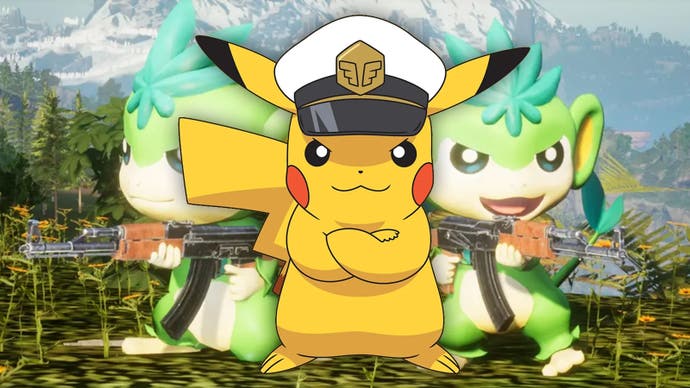"Exceedingly plausible" Nintendo crafted patent claims to specifically target Palworld, says IP expert
Developer Pocketpair is currently being sued.
Following last week's shock announcement Nintendo is suing Palworld maker Pocketpair for the infringement of "multiple patents rights", an IP expert has claimed it's "exceedingly plausible" Nintendo crafted its patent applications specifically to target Palworld.
Writing for Gamesindustry.biz, Andrew Velzen - an associate at law firm MBHB - started by summarising some of the intellectual property discoveries legal experts have made so far since word of Nintendo's lawsuit surfaced last week, starting with four key patent applications highlighted by Japanese attorney Kiyoshi Kurihara.
These patent claims, explains Velzen, all relate to different aspects of catching and/or riding "combat characters, "airborne rideable characters", and "field characters" using "player characters." Notably, all four patent applications were filed onto pre-existing "parent" patents by Nintendo and The Pokémon Company after the release of Palworld, and have ben accelerated to issuance using Japanese expedited examination procedures.
However, Velzen notes Nintendo didn't stop there. The company also filed two similar patents with the United States Patent and Trademark Office in May 2024, again after the release of Palworld, and several months after The Pokémon Company announced it would be investigating whether Palworld infringes on any "intellectual property rights related to Pokémon".
One of these US patent applications (US-App-3) relates to the in-game activity of throwing either a "catching item" or "fighting character" in a virtual space, while the other (US-App-4) focuses on boarding an object - selected from several objects the player characters owns - in order to provide instructions causing it to move, with specific mention of this happening while airborne. As with its Japanese patent claims, Nintendo paid to have the examination of its patent claims substantially expedited.
"Based on this information," Velzen says, "it is not overly speculative to assume Nintendo filed [its US patent applications] with the intention of targeting Palworld." He adds it's also "exceedingly plausible that these claims were crafted to read on aspects of Palworld."
While Nintendo's lawsuit is only targeting Japan at present, Velzen notes it's of interest that the company's US patent claims have both been been rejected during the expediated examination process - US-App-3 "only for lacking subject matter eligibility" and US-App-4 for "obviousness". Nintendo still has until October to amend its claims and/or argue against the rejections to try and get its applications across the finish line.
"If (i) Nintendo's litigation proceeds reasonably successfully in Japan and no global settlement is reached and (ii) the claims in the patent applications above do not require substantial modification in order to arrive at allowance, Nintendo will undoubtedly have the opportunity to file a similar suit for patent infringement in the US," Velzen explains, before adding "These are, admittedly, two pretty substantial 'ifs'."
"Regardless, though," he continues, "I think we are seeing just how seriously Nintendo views the threat of Palworld."
In a statement last week, Palworld developer Pocketpair confirmed it had received notice of Nintendo's legal action, but said it was "unaware of the specific patents we are accused of infringing upon". It has, however, vowed to fight Nintendo's lawsuit, to ensure small studios are "not hindered or discouraged from pursuing creative ideas".
The developer also released Palworld for PS5 across 68 countries and regions this week, although Japan wasn't one of them, leading many to assume Nintendo's lawsuit is to blame.









